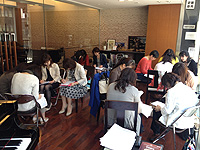What do The Writing Examinations Bring to Piano Teachers?
2014/12/16 | コメント(0)
| トラックバック(0)
|

PTNA holds the writing examination as one of the teachers' self-education programs, "ing" program. This is to examine to what extent teachers comprehend music theoretically and practically. The spring exam focuses on the required repertoires of PTNA Piano Competition, and the winter exam features popular music as well as classics.
Yo Nishio, composer, emphasizes the importance of theoretical knowledge to comprehend the narrative of music precisely and profoundly. According to him, it is not too early to teach them to children. For instance, they may compare how sounds are different, even if they do not understand technical terms.
The exam consists of 7 sections; listening comprehension, theoretical comprehension of 4 periods, music history, and teaching skills. The listening section asks examinees to point out the mistakes on performances, and to write how they should be corrected and improved. In the Baroque and Classic sections, examinees read and answer questions on analysis of a piece, and explain some keywords like basso continuo, counterpoint, sonata form, etc. In the Roman and Modern sections, they need to understand more complicate chords, tonality, and pedaling. In the music history section, examinees are asked about a composer and his back ground.
The most unique part might be the teaching section, which is free writing. Here is one of the example questions and answers from the exam in 2014 spring.
Q: "How do you teach a young student (age of 6-8) who can afford only electronic piano due to his/her living condition? And how do you make lesson plan to a young student who could have acoustic piano but practice on an electronic piano? Write down your opinion about teaching with electronic pianos, taking advantages and disadvantages into consideration."
A: "It is difficult for students to practice various touches and sounds on electronic pianos, but it helps them to read scores. So I will give them lots of pieces for site reading to help them read notes and scores as fast as possible. Of course, I teach them delicate touches, good form of fingers, various images of sounds, even if they practice on electronic pianos. But if the living environment allows them to have acoustic pianos, I will explain the importance of the instrument to their parents, and would suggest that they purchase grand pianos if possible...."
All the answers are put together on a booklet, and distributed to all the examinees after the examination.
【GoogleAdsense】